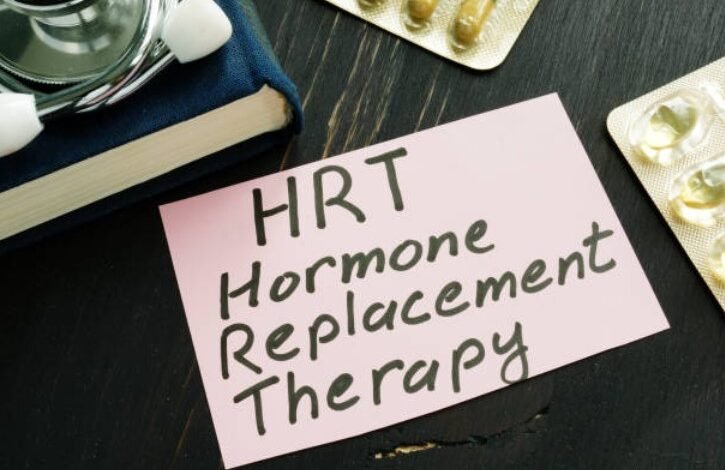How Hormone Replacement Therapy Can Improve Your Quality of Life

Hormone replacement therapy (HRT) has emerged as a vital treatment option for individuals experiencing hormonal imbalances, particularly those associated with menopause in women and andropause in men.
This therapy involves supplementing the body with hormones, such as estrogen, progesterone, or testosterone, to restore balance and alleviate symptoms that significantly impact quality of life. In this article, we will explore how HRT can improve quality of life by addressing various physical, emotional, and psychological aspects.
Understanding Hormone Replacement Therapy
What is Hormone Replacement Therapy?
Hormone replacement therapy (HRT) is a medical treatment used to replenish the body’s hormones, primarily estrogen and progesterone in women and testosterone in men.
These hormones decline naturally with age, leading to symptoms like hot flashes, night sweats, mood swings, and decreased libido. HRT aims to alleviate these symptoms by restoring hormone levels to a more balanced state.
Types of Hormone Replacement Therapy
There are different types of HRT, tailored to individual needs and medical conditions:
- Estrogen Therapy: Commonly prescribed for women who have had a hysterectomy. It involves the administration of estrogen alone.
- Combination Therapy: Involves a combination of estrogen and progesterone, suitable for women who still have their uterus. Progesterone helps prevent the risk of endometrial cancer that can be associated with estrogen alone.
- Testosterone Therapy: Used primarily for men experiencing symptoms of low testosterone, such as reduced energy, depression, and decreased muscle mass.
Modes of Administration
HRT can be administered through various methods, including:
- Oral Tablets: Convenient but may have a higher risk of side effects.
- Transdermal Patches: Applied to the skin, offering a steady release of hormones.
- Topical Creams and Gels: Absorbed through the skin, providing flexibility in dosing.
- Injections: Administered periodically, usually every few weeks or months.
- Implants: Small pellets inserted under the skin that release hormones over several months.
Physical Benefits of Hormone Replacement Therapy
Alleviation of Menopausal Symptoms
One of the most significant benefits of HRT is its ability to alleviate menopausal symptoms. Menopause is characterized by a decline in estrogen levels, leading to a range of uncomfortable symptoms such as:
- Hot Flashes: Sudden, intense heat sensations often accompanied by sweating and flushing.
- Night Sweats: Severe hot flashes that occur during sleep, causing discomfort and sleep disturbances.
- Vaginal Dryness: Reduced estrogen levels can lead to thinning and dryness of the vaginal tissues, causing discomfort and pain during intercourse.
- Sleep Disturbances: Hormonal fluctuations can disrupt sleep patterns, leading to insomnia or poor-quality sleep.
Bone Health
Estrogen plays a crucial role in maintaining bone density. As women age and estrogen levels decline, the risk of osteoporosis and fractures increases.
HRT can help preserve bone density, reducing the risk of osteoporosis and related fractures. Studies have shown that women who undergo HRT have a significantly lower risk of hip and vertebral fractures compared to those who do not receive the therapy.
Cardiovascular Health
There is evidence suggesting that HRT may have a protective effect on cardiovascular health, particularly when started around the time of menopause. Estrogen has a favorable impact on cholesterol levels, helping to maintain a healthy balance between HDL (good) and LDL (bad) cholesterol.
This, in turn, can reduce the risk of heart disease and stroke. However, it is essential to note that the timing of HRT initiation is crucial, as starting HRT later in life may carry different cardiovascular risks.
Muscle Mass and Strength
Testosterone therapy in men has been shown to improve muscle mass, strength, and overall physical performance.
As men age and testosterone levels decline, they may experience a decrease in muscle mass and an increase in body fat. HRT can help counteract these changes, promoting a healthier body composition and improved physical function.
Emotional and Psychological Benefits of Hormone Replacement Therapy
Mood Stabilization
Hormonal fluctuations can have a profound impact on mood and emotional well-being. Many individuals undergoing menopause or andropause experience mood swings, irritability, anxiety, and depression.
HRT can help stabilize mood by restoring hormonal balance. For women, estrogen has been found to have a positive effect on serotonin levels, a neurotransmitter that regulates mood. Similarly, testosterone therapy in men can alleviate symptoms of depression and improve overall mood and energy levels.
Cognitive Function
There is growing evidence that HRT may have a beneficial impact on cognitive function, particularly in women. Estrogen has neuroprotective properties and may help reduce the risk of cognitive decline and dementia.
Studies have shown that women who start HRT early in menopause may experience better memory and cognitive performance compared to those who do not undergo the therapy. However, more research is needed to fully understand the long-term effects of HRT on cognitive health.
Quality of Life and Well-Being
The alleviation of physical symptoms and mood stabilization provided by HRT can significantly enhance overall quality of life and well-being. Improved sleep, reduced pain, and better emotional health contribute to a more positive outlook on life.
Individuals undergoing HRT often report feeling more like themselves, with a renewed sense of vitality and enthusiasm for daily activities.
Risks and Considerations of Hormone Replacement Therapy
Potential Risks
While HRT offers numerous benefits, it is essential to consider the potential risks and make informed decisions based on individual health profiles. Some potential risks associated with HRT include:
- Increased Risk of Certain Cancers:In women with an intact uterus, long-term use of estrogen-only HRT has been associated with an increased risk of endometrial cancer. Combination therapy (estrogen and progesterone) helps mitigate this risk. There is also a slightly increased risk of breast cancer with long-term HRT use.
- Cardiovascular Risks: The impact of HRT on cardiovascular health is complex and may vary depending on the timing of initiation and individual health factors. While HRT may have protective effects when started around the time of menopause, it may carry risks if started later in life.
- Blood Clots: HRT, particularly oral forms, can increase the risk of blood clots, which can lead to deep vein thrombosis (DVT) or pulmonary embolism (PE).
Individualized Approach
Given the potential risks, it is crucial to take an individualized approach to HRT. Healthcare providers consider factors such as age, health history, symptom severity, and personal preferences when recommending HRT. Regular monitoring and follow-up appointments are essential to assess the ongoing benefits and risks of the therapy.
Read also: Using Speech Therapy Products to Support Language Development in Toddlers
Alternatives to Hormone Replacement Therapy
For individuals who cannot or choose not to undergo HRT, several alternatives can help manage symptoms and improve quality of life:
- Lifestyle Modifications: Maintaining a healthy diet, regular exercise, and stress management can have a positive impact on hormonal balance and overall well-being.
- Non-Hormonal Medications: Some drugs, such gabapentin and selective serotonin reuptake inhibitors (SSRIs), can help with menopausal symptoms like mood swings and hot flashes.
- Herbal Remedies: Some individuals find relief from menopausal symptoms through herbal remedies such as black cohosh, red clover, and soy isoflavones. However, the efficacy and safety of these remedies vary, and it is essential to consult with a healthcare provider before use.
Conclusion
Hormone replacement therapy has the potential to significantly improve the quality of life for individuals experiencing hormonal imbalances, particularly during menopause and andropause. By alleviating physical symptoms, stabilizing mood, and enhancing overall well-being, HRT offers a pathway to renewed vitality and improved health.
But it is crucial to approach HRT thoughtfully, weighing the advantages and disadvantages, and treating each patient as an individual with a comprehensive plan. As research and personalized medicine continue to advance, the future of HRT holds promise for even better outcomes and enhanced quality of life for those seeking relief from hormonal imbalances.




